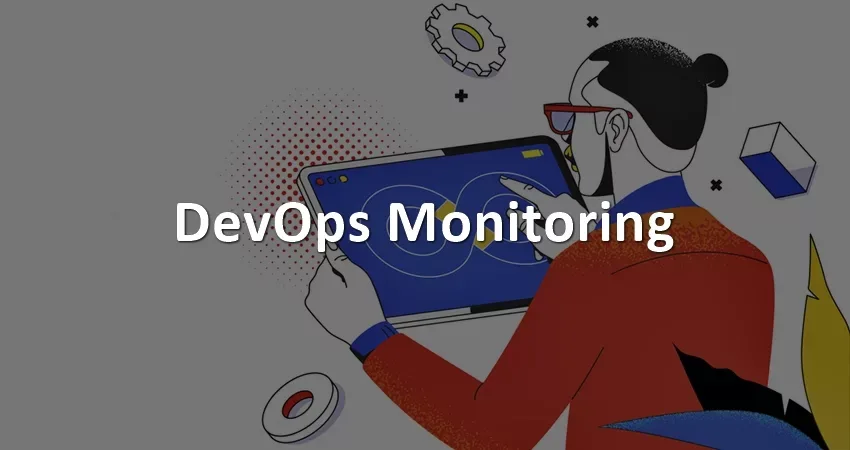DevOps is a combination of practices for the optimal integration of software development processes, quality assurance (QA), and IT operations.
The set aims to provide continuous delivery of quality software applications in shorter time duration.
DevOps monitoring ensures that the automation and integration for software development and deployment is on the right path without any adverse effects on its workflow and teams.
It ascertains collaborative working and offers a more stable operative environment.
Performance and management of every person, process, and product guarantees a shorter system development life cycle.
The DevOps process has gone much beyond just a quick deployment process and writing quick application codes.
DevOps monitoring tools help manage the increasing complexity of automating optimal infrastructure, integration, testing, packaging, and deploying everything in the cloud.
Quickly and securely trace your usage patterns and app performance in every environment. It furthermore helps generate a better customer feedback strategy and a flexible deployment.
What are the Best Practices for DevOps Monitoring?
An uninterrupted approach is needed to attain maximum benefits from DevOps monitoring.
Each stage of the delivery pipeline requires careful and continuous planning, building, testing, and deployment.
Perform the following practices for a proper DevOps monitoring implementation in business.
Gain the highest transparency and control over your app development cycle and IT operations with DevOps monitoring tools.
It’s also a secure and efficient way to trigger a collaborative customer feedback loop and optimization.
Create Step-by-Step Strategies
Collect and evaluate all the information and data needed. Look into all the possible data sources to perform a higher performance solution.
It is an efficient way to gain wholesome insights for the process to operate smoothly.
Perform data analysis, determine milestones, and evaluate process failures from the data history.
Know what resources are furthermore missing from your organization for overall smooth processing.
Activity Alert Automation
Get real-time activities with the help of automation. The automation decreases the time taken to react over a situation. And the team has better collaboration with each other.
Automated notifications drive in and out the consistency of queries and solutions. It lowers effort and simplifies communication between the teams.
Proper DevOps monitoring tool helps you in configuration and scanning to ensure the overall health of the system.
Keeping Vulnerabilities in check
Manage and control your organization already known and possible weaknesses accordingly.
Vulnerabilities like in coding, designing, or security issues need to be handled ahead of time.
Multiple monitoring tools and automation software are available to help you in any software application process.
Create positive user experience with metric monitoring and appropriate custom thresholds and real-time notifications.
Make well-informed management decisions with the right monitoring approach. Know when to load reduction, or a disk upgrade would be needed.
The forecasting helps you in timely troubleshooting and adequately address the upcoming challenges.
Also Read: What is DevOps from Business Perspective?
What are the Best DevOps Monitoring Tools?
With all the collected data and insights, select appropriate DevOps monitoring tools to manage application quality and workflow speed.
According to your budget, you will find many popular affordable alternatives that help you manage DevOps from scratch effortlessly. You could also employ open-source DevOps tools available in the market.
Given below are three of the best DevOps monitoring tools available right now:
AlertSite
Alersite is a proactive monitoring tool for your websites, web apps, and APIs that features:
- Easy to use APIs
- Hybrid Deployment – full visibility of complete digital performance
- Fast and Intelligent Alerting
- Ops and DevOps tool stack Integrations
- Single Sign-On (SSO)
Applications Manager
Enhance the DevOps Monitoring strategy with ManageEngine’s Applications Manager. This robust solution lets you gain deeper visibility, pinpoint issues faster, and proactively optimize performance across your entire IT infrastructure. It supports over 150 technologies spanning across servers, cloud storage, containers, web servers, websites, applications, databases, virtual machines (VMs), converged infrastructure, messaging components, services, big data elements, middleware, and others.
The features of Applications Manager include:
- Gain insights into resource utilization metrics like memory, CPU, and disk usage to ensure optimal application resource utilization.
- Trace end-to-end requests across distributed systems.
- Evaluate user satisfaction through metrics like response times, throughput, requests, errors, and Apdex scores.
- Identify elements contributing to slow transactions by keeping a close eye on database operations and underlying actions.
- leverage thread profiling for in-depth analysis of intricate production problems, instead of relying solely on thread dumping.
- Drill down into application interactions to pinpoint the root cause of issues.
By leveraging Applications Manager, organizations can proactively identify issues, detect core causes for issues, limit latency in fixing those, enhance user experience, and improve collaborations between teams.
Consul
Consul by HashiCorp is a modern DevOps friendly service mesh solution. It increases system scalability and reduces the usage amount of networking and compute resources. One can easily access services from a cluster of multiple machines.
It offers a cross-functional control plane with configuration, service discovery, health checking abilities, and much more. It’s other key features:
- Edge-triggered updates
- Secure Service Communication
- Multi Datacenter
Nagios
Nagios is a widely popular monitoring system for IT infrastructural issues in businesses. It is a stable and highly scalable platform that could monitor up to thousands of nodes. Its key features include:
- Full access to source code (Open Source Software)
- Robust Reporting & Analytics
- Increased visibility
- Quick alert notifications
Key features of a Good DevOps Monitoring Tool
- Easy to use dashboard
- Full-stack application monitoring
- In-depth analysis
- Lower learning curve
- Real-time performance metrics
- Rest APIs
- Trends and predictions: Decision-making tools
- Troubleshooting
- Wide availability
The selection of DevOps monitoring tools depends upon your organization’s goals and needs.
Identify what your business demands and what your process lacks in terms of inventory and employee skills.
It’s also essential to carefully examine the level of customization available in any particular element and integration flexibility.
You May Also Like To Read-

